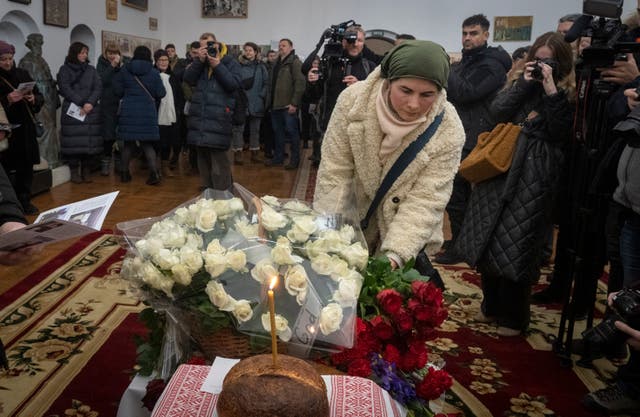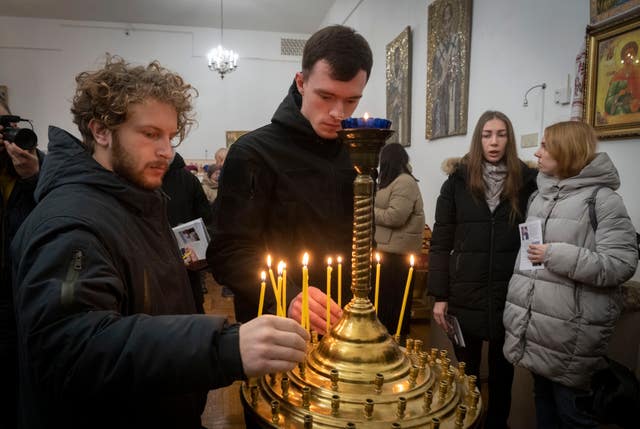Friends and volunteers have gathered to say goodbye to Andrew Bagshaw, a dual New Zealand-British citizen killed in Ukraine while he and another volunteer, who also died, tried to evacuate people from a frontline town.
Mr Bagshaw, 47, and British volunteer Christopher Parry, 28, vanished this month while heading to the town of Soledar, in the eastern Donetsk region, where heavy fighting was taking place.
Volunteers spoke of their memories of Mr Bagshaw and read tributes from his family at Kyiv’s St Sophia’s Cathedral on Sunday.
Nikolletta Stoyanova, a friend in Ukraine, shared tales of his bravery, saying: “Even if no one wanted to go to Soledar, they can do that. Because if he understood that someone needs help, they need to do this help for these people.”

Mr Bagshaw’s father, Phil, told reporters in New Zealand his son wanted to do something to help.
“He was a very intelligent man and a very independent thinker,” he said. “And he thought a long time about the situation in Ukraine and he believed it to be immoral. He felt the only thing he could do of a constructive nature was to go there and help people.”
Ukrainian police said on January 9 they lost contact with Mr Bagshaw and Mr Parry after the two headed for Soledar. Their bodies were later recovered. A Ukrainian official said on Wednesday the defending forces made an organised retreat from the salt-mining town.
In a January 24 statement, Mr Parry’s family said he was “drawn to Ukraine in March in its darkest hour”. They said he had “helped those most in need, saving over 400 lives plus many abandoned animals”.
Friends said the men’s bodies will be handed over to relatives in the UK.

In the south of Ukraine, Russian forces on Sunday heavily shelled the city of Kherson, killing three people and hurting six others, the regional administration said. It said the shelling damaged a hospital, school, bus station, post office, bank and homes.
Among those reported injured were two women in the hospital at the time: a nurse and a cafeteria worker. Russian forces retreated across the Dnieper River from Kherson in November but still hold much of the province of the same name.
On Sunday, Russia’s Foreign Ministry accused Ukraine and its western allies of war crimes in connection with the shelling of two hospitals in Russian-held parts of Ukraine.
Russian officials said 14 people died on Saturday when a hospital in the eastern Luhansk province settlement of Novoaidar was hit. They said shells also fell on the territory of a hospital in Nova Kakhovka, a Russian-occupied city in Kherson province where a strategically vital bridge across the lower reaches of the Dnieper is located.
“The deliberate shelling of active civilian medical facilities and the targeted killing of civilians are grave war crimes of the Kyiv regime and its western masters,” the Foreign Ministry said.
“The lack of reaction from the United States and other Nato countries to this, yet another monstrous trampling of international humanitarian law by Kyiv, once again confirms their direct involvement in the conflict and involvement in the crimes being committed.”
Latest Defence Intelligence update on the situation in Ukraine – 29 January 2023
Find out more about the UK government's response: https://t.co/Uq5hma9yKs
🇺🇦 #StandWithUkraine 🇺🇦 pic.twitter.com/FD9fqU8Yiz
— Ministry of Defence 🇬🇧 (@DefenceHQ) January 29, 2023
Russian forces have shelled hundreds of hospitals and other medical facilities in Ukraine since the war began, reducing more than 100 of them to rubble, according to the Ukrainian Health Ministry.
Russian state TV aired footage of what it said was the damaged hospital in Novoaidar. It said rockets hit the paediatric department of the two-storey building.
“There are no military factories here. There are no military vehicles. No tanks. Who did you shoot at?” Olga Ryasnaya said in an interview on Russian TV, which identified her as a paediatric nurse.
Luhansk province, where Novoaidar is located, is almost entirely under the control of Russian forces or Russian-backed separatists. Russian and separatist officials alleged the hospital was deliberately targeted. The movements of journalists are restricted in areas of Ukraine under Russian control.
The Institute for the Study of War, a Washington-based think tank, said Ukrainian forces were likely increasing strikes on Russian positions deep inside Luhansk province, closer to the Russian border, in an effort “to disrupt Russian logistics and ground lines of communication”. It said the strikes could be part of preparations for a future counteroffensive.




Comments: Our rules
We want our comments to be a lively and valuable part of our community - a place where readers can debate and engage with the most important local issues. The ability to comment on our stories is a privilege, not a right, however, and that privilege may be withdrawn if it is abused or misused.
Please report any comments that break our rules.
Read the rules here